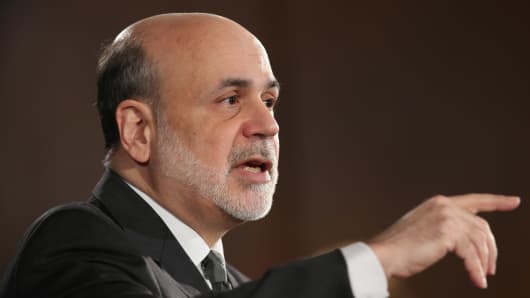Sequestration: How much of a headwind for stocks? This morning Bank of America/Merrill Lynch estimated that full sequestration of roughly $110 billion per year would cost $1.20 in lost earnings per share to the S&P 500, roughly one percent of profits.
Eight to 10 percent of S&P 500 sales come from government sources, they estimate, with three-quarters of that in defense and health care. Defense, where cuts would likely result in several hundred thousand jobs lost, might be most heavily hit because valuations are still well above historic levels. Health care could see cuts to Medicare of about two percent, along with funding cuts to health-care agencies like the National Institute for Health, but health care valuations are low, so the hit to those stocks may be less. Long term, the effects may be modest.
There seems to be more worry about the March 27 expiration of the Continuing Resolution on the budget. The bulls are betting the CR will be extended through the end of fiscal year 2013 (September).
Elsewhere:
1) Retail earnings fair: Both Home Depot (HD) and Steven Madden (SHOO) provided full-year earnings guidance that is below expectations, while Macy's (M) full-year guidance is above expectations. AutoZone (AZO) beat estimates, but noted that the roughly two-week delay in processing income tax refunds contributed to a decline in sales in January.
2) Well at least we know: Populism trumps austerity. By a mile, at least in Italy, where a comedian (Bepe Grillo) and a disgraced former Prime Minister (Berlusconi) — both running on populist, anti-austerity programs — beat Mario Monti by a wide margin.
Grillo ran on cutting the work week to 20 hours, giving monthly 900 euro stipends to the unemployed, and renegotiating all debt. Berlusconi, in an outright bribe, promised to pay 4 billion euros out of his own pocket to refund the property tax.
He may get his chance.
How bad is it for Italy? I was surprised that a number of traders last night tried to tell me it was not such a big deal. Italian debt will go through the roof, I say. No it won't, they say: Italian 10-year debt is now 4.85 percent and may go over 5 percent.
So what? It's manageable, they say. Italy will not renege on its debt, it's mostly owned by Italians. The new government is stillborn and gridlocked, I say. So what? They've had 50 governments in 60 years; the structure of the parliament creates inherent instability. The election creates doubts about the stability of the euro zone and the euro, I say. No it doesn't, they say. Italy will never leave the euro.
On and on. I do not understand this thinking. Stability in the last few months has been based on the belief that, however slow, progress is being made on improving competiveness, a fairer tax structure, etc. Now, there is no political mandate for reform. All that is left is a vague hope for a grand coalition of Bersani, Berlusconi, and Monti. This I want to see.
—By CNBC's Bob Pisani










